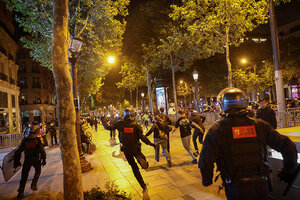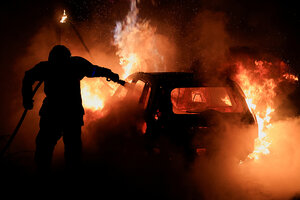In French protests, a demand for dignity

People run, followed by police officers during riots at Champs-Élysées in Paris, July 1. The riots were in response to the death of Nahel, a teenager killed by a police officer during a traffic stop.
Nacho Doce/Reuters
Nanterre, France
The unrest that has set cities across France ablaze has taken shape as one of the most significant social justice protests in the country in years, perhaps decades.
For more than six days, many French fell asleep to sirens, gunfire, and fireworks, and woke up to charred cars, pillaged stores, and city halls and schools set on fire. Mayors’ homes have been attacked.
Everyone from politicians to French footballers has appealed for calm. The government has deployed 45,000 police officers every night since Friday to quell the violence.
Why We Wrote This
Protests and rioting erupted across France after police killed a teen from an immigrant community last week. The unrest has been a tipping point for France’s minority groups, which have long felt pushed to the margins.
By Monday, rioting had largely abated. Yet a three-word message scrawled onto walls across the country points to an anger that has not: justice for Nahel.
Nahel, a Franco-Algerian teen whose last name has not been publicly disclosed, was 17 years old when he was killed by a police officer last Tuesday during a traffic stop. The interaction was filmed by a bystander and has since brought a nationwide reckoning.
At issue is a 2017 law that gives police officers greater authority to use force. Activists say it has dramatically increased the number of deadly shootings during traffic stops. More broadly, Nahel’s death is the latest in a series of flashpoints kindled by claims of endemic racism across French society against ethnic minorities. Particularly in Paris’ underserved suburbs known as banlieues, minority groups and immigrants have long felt marginalized and discriminated against by the state. The riots after Nahel’s death have held a clear message, especially among French youths: no more.
“Dignity is really central to what’s happening,” says Mounira Chatti, a professor at the Université Bordeaux Montaigne who studies integration. “Right now, these youth feel discriminated against at school, at work. ... They’re victims of racial profiling by police.
“If we’re going to get out of this situation, the government needs to send a very strong signal to young people from immigrant backgrounds: You belong to this country; you have your place here.”
Echoes of the past
Many observers have compared the situation to 2005, when two teenage boys were electrocuted while hiding from police in a power substation in the Paris suburb of Clichy-sous-Bois. Their deaths set off a wave of riots that lasted three weeks and cost the state an estimated €200 million ($218 million).
To those in immigrant banlieues, Nahel’s death points to a marked lack of progress.
“Since 2005, nothing has changed! The police are still targeting our kids in the banlieues. It’s intolerable,” says Laurence Bedé, a Franco-Algerian mother of three girls living in a suburb near Nanterre, where she came to attend a march for Nahel last Thursday.
“We’re fed up,” says her teenage daughter Maissane, breaking down in tears. “We just want to be given a chance.”
The French government has denied racism in its police force. But a January 2017 report by Jacques Toubon, France’s independent human rights defender, showed that North African and Black men were 20 times more likely to be stopped by police than the rest of the population.
In February 2017, in response to public pressure to appear tough on crime and terrorism, the government passed a law offering police officers more rights to use their service weapons. Previously, police had to justify legitimate self-defense. The new law allows them to fire on motorists they deem a potential threat to the general public.
Interior Minister Gérald Darmanin said the law has not affected officer behavior. But data compiled by researchers shows that deadly shootings during traffic stops have increased sixfold since 2017. In 2022 alone, 13 deadly shootings were registered – an unheard-of number in France – with three this year. Those numbers are independent of any overall rise in crime.
“We saw a massive, indisputable effect of the 2017 law,” says Sebastian Roché, a policing expert at France’s National Center for Scientific Research, who was part of the research team on police violence.
The law was passed on Feb. 28, 2017, and in the year that followed, five motorists were killed by police, says Mr. Roché. During the previous five years, that number had been zero.
“These were the same police officers with the same weapons,” adds Mr. Roché. “The only thing that changed was the law.”
French police union officials could not be reached for comment, but Mr. Roché argues the law left no time for training. And he points to other concerning trends within French policing. Independent of the 2017 law, a 2022 report by France’s public auditor, the Cour des Comptes, showed that 40% of officers had failed to complete their required basic shooting training.
Roots of mistrust
Minority groups in the banlieues have long expressed a deep mistrust of the police. The officer who shot Nahel initially suggested that the teen had been driving toward him, posing an immediate threat. But the video posted online showed him questioning Nahel at the driver’s-side window before Nahel sped off. The officer has since been charged with voluntary manslaughter.
“The video is a very important component in all this. Normally you have several versions of events that contradict each other, but with this incident, that wasn’t possible,” says Julien Talpin, a sociologist at the National Center for Scientific Research. “It allowed indignation to build. [Young people in struggling suburbs] already feel that the police kill and lie, but now they have proof.”
This mistrust is now boiling over.
“These young people rioting have watched their parents, their older siblings be discriminated against time and time again, and they’ve had enough,” says Naima Iratni, president of Maison d’Algérie, a Paris-based nonprofit that promotes cooperation between youths in France and Algeria. “This generation – they’re 14 to 18 years old – is saying, ‘Stop.’ They will not accept it anymore.”
Ms. Iratni says much of the discrimination against second- and third-generation North African and sub-Saharan African young people is a result of France’s inability to shed colonial ways: “Now the colonizer is colonizing at home instead of abroad.”
Objects, not subjects
Numerous studies have shown that visible minority groups face more discrimination in French schools than other students, a discrimination that follows them into the workplace. A 2020 study found that candidates with Arabic names had 25% lower chances of getting a positive response during a job search.
“These young Arab and Black people are always the objects of public discourse and not the subjects,” says Ms. Chatti. “What these young people need right now is intermediaries who can reason with them. They don’t want to listen to the government.”
France has periodically had to face such existential questions about national identity and integration. In 2018, former centrist Minister Jean-Louis Borloo produced an ambitious 60-page report on how to restructure and revitalize France’s struggling banlieues. But the report was largely ignored, and many experts say that today’s unrest has a direct link to the government’s failure to implement Mr. Borloo’s recommendations.
On Thursday, politicians from the far-left La France Insoumise party proposed a different first step. They introduced draft legislation that would abolish the 2017 police law and, perhaps, provide a sense of justice.
“I look at what happened to Nahel and I think, he could have been my little brother,” says Ben Abdallah Adem, a teenager from the Paris suburbs. “There’s no respect anymore when it comes to how police treat us. When they stop us, it’s harsher than ever. I just want the police to offer a sense of protection. We shouldn’t be afraid of them.”


